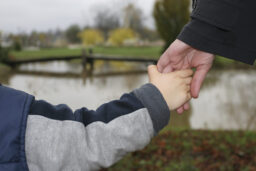Childhood Monsters
“I knew there was something terrible down in the cellar. I just knew, because the cellar was dark and damp and it smelled.” Harry and the Terrible Whatzit (Clarion Books) by Dick Gackenbach is one of several children’s books we read with young children who come to our office because they are worried, fearful or anxious.
Children worry even under the best of circumstances. Many worries or fears are predictable based on a child’s age and development. Some children are simply born with temperaments that make them more prone to fears.
Parents, however, don’t always know how to best respond to their fearful child. Not all children openly admit they are scared of the dark or worried that something dangerous just might be living under their bed. Instead, your 5- or 7-year-old might stall when it is time to get ready for bed and refuse to go upstairs by himself, leading to arguments and conflict.
Anxiety in its simplest form is the fear that something bad is going to happen. If you cannot predict a positive outcome of a situation, you experience worry. Fear and anxiety are often accompanied by physical symptoms so children express somatic complaints (stomach hurts, heart races, head aches).
In the story, Harry confronts the Whatzit—who, by the way, does live in the basement and is “double-headed, three clawed, six-toed, and long horned.” When Harry faces the Whatzit, the monster begins to shrink. Harry overcomes his fear by acknowledging it. Harry decides for himself to confront the Whatzit; it’s important to note he was not “forced” by someone to tackle his fear.
There are several ways a parent can help a child cope with unreasonable fears or anxieties.
* Don’t try to convince your child he should not feel fearful. As parents, we look under the bed and in closets in an attempt to reassure our child that it’s safe—with poor results. Instead, help you child accept his fear. “It’s all right to feel fearful, but let’s work on not letting your fears keep you from doing things.”
* Try to be patient and understanding. The fear your child feels is real.
* Reasonable struggles for children are good. It helps them develop emotional muscle and confidence. Most fears fade in time. As your child learns to confront an emotionally uncomfortable situation and survive, it provides a good life skill.
* When we work with children in our office, we sometimes encourage them to talk about a fear as something outside themselves. As a parent, you might say the fear is pushing your child around, keeping her from going upstairs to her room alone. Point out that her fear is working on her, keeping her from doing the things she enjoys.
* Talk with your child about his fears. Often parents worry that talking may make the fears worse. In fact, most children find it helpful to talk about their worries with someone they trust. You might have your child draw a picture of his nightmare or the monster under his bed. He might then draw picture that shows him scaring the monster away. Talking also may help you discover if there is an underlying anxiety or worry that you can address.
* If your child has a problem with nightmares or fears, reduce or eliminate outside stimulation such as watching scary movies, TV programs and video games. Even children walking by a TV that shows the news can find it heightens their fears.
* Read books to your child that model children finding ways to gain mastery over their fears
* Look for practical solutions. If it helps your child feel comfortable by leaving a light on and the closet door open (or closed) try to accommodate her.
* Break down confronting fears into small steps. For instance, if she is fearful about sleeping alone, tell her you will come in every 15 minutes to check on her. She may better be able to handle being alone with her fear in 15-minute increments but feel overwhelmed about making it through the entire night.
* When do you need outside professional help? A basic guideline is how great an impact your child’s fear is having on the quality of his daily life. If you’re worried, talk to your pediatrician or a mental health professional who works with children.


